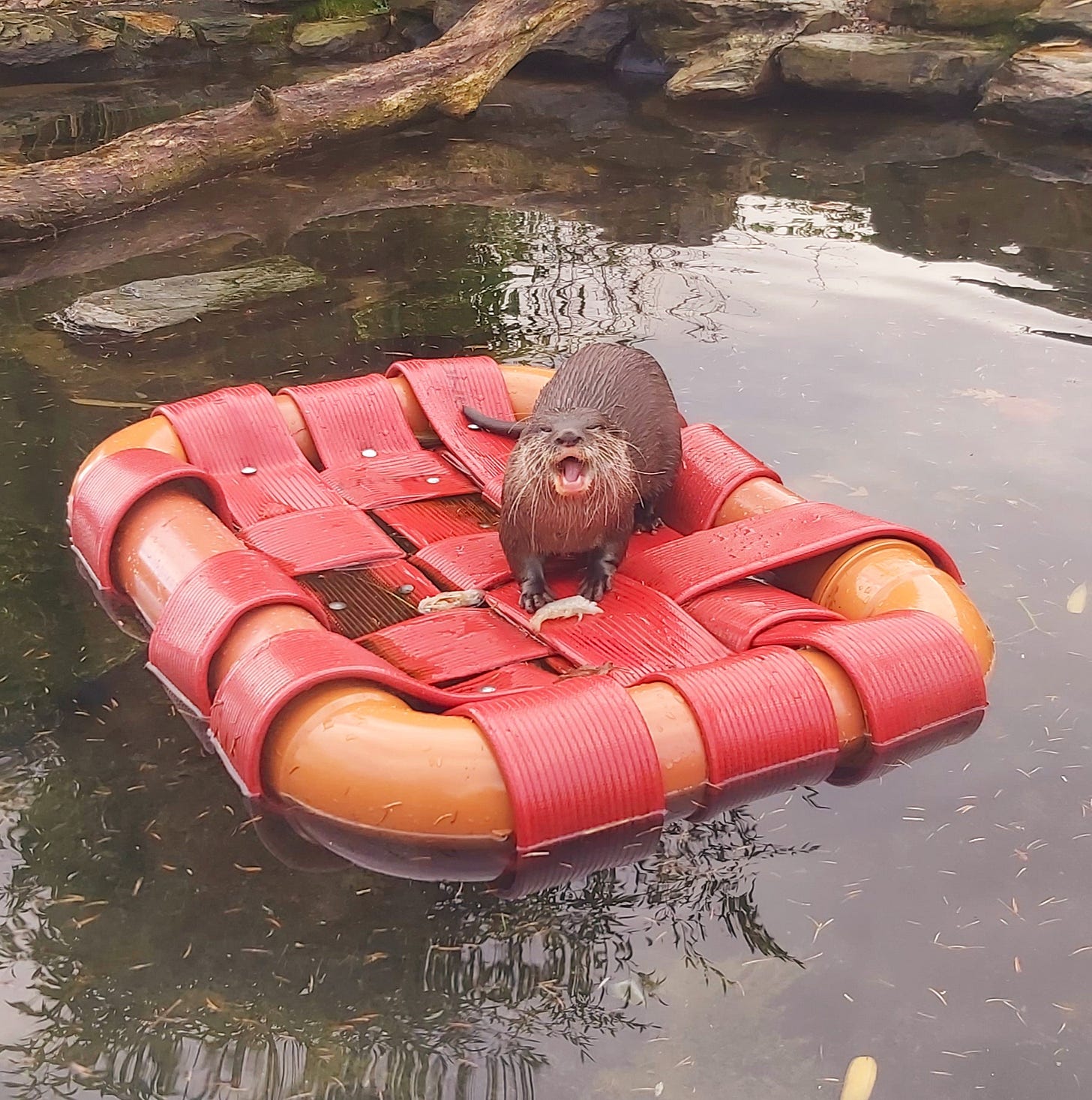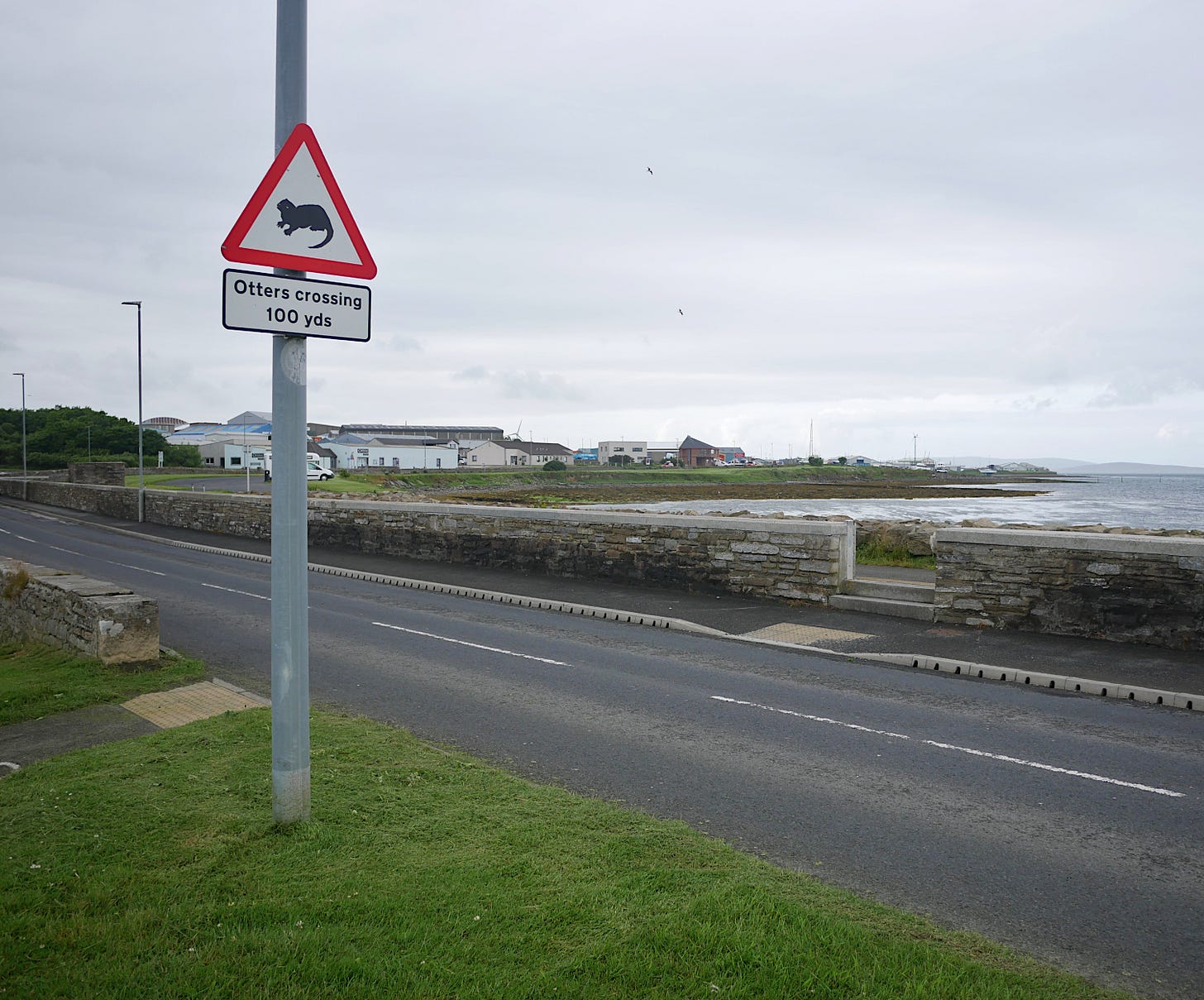Hello, dear reader, and welcome to another issue of AI, Law, and Otter Things! The post you are now reading was originally sent on 28 May 2025, which happens to be World Otter Day. This date, which is celebrated yearly on the last Wednesday of May, is meant to draw attention to the conservation of the 13 extant species of otters, at least one of which is native to each continent other than Australasia1 and Antarctica.2 As the title of this newsletter suggests, I am pretty fond of these little semi-aquatic mustelids, and would invite you to learn more about the threats to their continuing existence—such as attempts at domestication and keeping them in otter cafés.3 Lacking any particular expertise about them, however, I will mostly write about law and technology, as usual.

Today’s issue will feature some thoughts on my decision to share my PhD thesis in open access. After that, the usual: reading recommendations, open jobs and calls for papers, and even more otters. Hope you enjoy!
My PhD is now available online
Whenever one is finishing a PhD in one of the more verbose disciplines,4 there is an expectation that one will soon publish it as a book. Nowadays, that is somewhat mitigated by a growing acceptance of the stapler approach prevalent in more math-y disciplines, where a PhD is a collection of articles united by an introduction and a conclusion. Still, in many academic cultures one is expected to publish a book based on their PhD thesis. That book is sometimes a slightly revised version of the thesis, addressing typos and examiner comments and more generally meeting the style requirements of a given publisher. It can also reflect a more refined product, in which the author removes much of the scaffolding that is required in a thesis in order to show they know their stuff, clarifies argumentative flows, and/or incorporate follow-up research. Either way, publication tends to be a way to make your work more accessible and advance your career.
My own thesis was written with the idea of eventually becoming a book. Though I had published some articles about AI regulation during my PhD, my thesis contains a large amount of new material. This is because I tried to seize the opportunity to find common trends among various topics that caught my interest during my doctoral research. As a result, I have not published on technology neutrality so far,5 despite the centrality of the subject in my research agenda even nowadays.
I have not given up on publishing that book, or trying to spin off some articles out of it. Even so, I have decided to make the thesis available in Open Access, and now you can download it from Cadmus, the EUI repository. It is a 250-page manuscript on technology-neutral regulation and the EU legal framework on AI, which engages with administrative law and policy studies, but you can find a short abstract at the website, and a slightly longer overview here.
Under EUI policy, every thesis is released in open access 4 years after its defence, unless the author decides to release it before hand or a book version is published in a way that prevents release. My decision to release after a bit less than a year was driven by a few factors:
I now have a clearer vision of the book I want to write from this research, and it is somewhat different from the thesis I wrote. Though I still stand by my main arguments and findings there, I want to further develop some aspects and downplay others.
Because my thesis emerged as a bottom-up work, it ended up focusing on the EU approach to AI regulation. However, further research leads me to believe my points on technology neutrality are more generally relevant, not just for the regulation of digital technologies but for other forms of technology regulation. My book will incorporate this.
In my book, I intend to further develop my procedural account of technology neutrality. This I will do by showing how that procedural account can help us mobilize concepts from policy studies in order to analyse how regulation is made technology-neutral in practice.
There is a growing buzz surrounding technology neutrality in regulation, and I believe my thesis, even in its current stage, can be useful to colleagues working on those topics.
As somebody who has been educated by a considerable amount of public funding (most of which comes from a notably unequal South American country), I feel like having a version of my ideas accessible for free is a way to give some return on the taxpayers’ investment in my education.
As a result, the thesis you can now read is better understood as the preliminary version of a much-refined book that will come out sooner rather than later, with any luck. Hopefully, my work plan will be enough to persuade some publisher of the added value of publishing the book I have in mind, but that remains to be seen. Nonetheless, I believe the value of having my ideas out there outweighs the potential drawbacks for it. Let’s see whether I still hold the same opinion in a few years…
…in the meantime, don’t hesitate to reach out with your thoughts and impressions!
Recommendations

Laura Bartoli, ‘Cybersecurity and the Fight against Cybercrime: Partners or Competitors?’ [2025] European Journal of Risk Regulation 1.
Isabelle Christine Donatz-Fest, ‘Cop, Code, and Conduct: A Practice-Based Understanding of Responsible Policing in the Algorithmic Age’ (PhD in Public Management & Innovation, Utrecht University 2025).
Xinchuchu Gao, ‘The EU’s Twin Transitions towards Sustainability and Digital Leadership: A Coherent or Fragmented Policy Field?’ (2025) 59 Regional Studies 2360053.
Abe Hendriks, Kamilla Karhunmaa and Pierre Delvenne, ‘Shaping the Future: A Conceptual Review of Sociotechnical Imaginaries’ (2025) 170 Futures 103607.
Stefaan van der Jeught, ‘The Multilingualism Paradox in EU Law: In Our Own Language Version We Trust’ (2025) 14 International Journal of Language & Law (JLL) 81.
Timothée Schmudde, ‘What a Research Stay Can Do for You’ (21 May 2025).
Arianna Vedaschi and Chiara Graziani, Artificial Intelligence, Counter-Terrorism and the Rule of Law: At the Heart of National Security (Edward Elgar Publishing 2025).
See also the recently-released Elgar Research Handbook on Competition and Technology, featuring a chapter I co-wrote with Juliano Maranhão and Giovanni Sartor on competition in and through AI.
Opportunities

GiKii, the conference for law nerds interested in pop culture, will take place in Amsterdam this year, on 11-12 September 2025. Their call for abstracts is open until 31 May.
The Tübingen Conference for Artificial Intelligence and law will take place from 5 to 6 November 2025, inviting interdisciplinary perspectives on AI and Law. Abstracts are due by 3 June.
In Leiden, the eLaw centre is looking for a Postdoc or Junior Researcher in Law & Responsible AI for Critical Infrastructure, with a focus on sewer management. Applications are due by 9 June.
The Center for AI and Digital Policy (CAIDP) invites applications for its Fall 2025 AI Policy Clinics. The AI Policy Clinics are intensive, interdisciplinary, semester-long courses established to train future leaders in the AI policy field. Applications are due by 15 June, with activities in the clinics starting by 8 September.
Professors Eleni Kosta and Inge Graef at Tilburg University are recruiting a PhD researcher to work on issues relating to liability for the collection and use of data in the context of cybersecurity. Applications are open until 20 June.
Marguerite Borelli, Ksenia Ermoshina, Francesca Musiani, & Gulnara Zakharova are guest editing a special issue of the Internet Policy Review on Big tech in global security governance. They invite abstracts by 21 September.
Thanks for your attention! Hope you found something interesting above, and please consider subscribing if you haven’t done so already:
Do not hesitate to hit “reply” to this email or contact me elsewhere to discuss some topic I raise in the newsletter. Likewise, let me know if there is a job opening, event, or publication that might be of interest to me or to the readers of this newsletter. Hope to see you next time!
Sorry for any (inter alia) Aussie and Kiwi readers!
Sorry, Elder Things!
Otters are not domestic animals, as cute as they might look in human-adjacent contexts.
Usually, those in the Social Sciences, Humanities, and Arts, though I claim no familiarity with practices beyond legal academia in Brazil and Europe and Brazilian philosophical academia.
Except for a paper derived from the thesis, which has been under review for 9 months now rather than receiving a rejection (desk or otherwise).




